How to Answer What Is Your Greatest Strength in an Interview

When preparing for a job discussion, it’s important to be ready to describe what makes you stand out as a candidate. Employers are looking for specific attributes that show you’re a good fit for the role. Knowing how to express these personal qualities with clarity and confidence can make a significant difference in your performance.
The key to a successful response lies in choosing the right qualities to present and explaining how they will benefit the company. This requires a balance between showcasing your talents and aligning them with the organization’s needs. A well-thought-out explanation not only reflects your skills but also demonstrates self-awareness and understanding of the job’s requirements.
In this guide, we’ll explore how to effectively communicate what you bring to the table. By providing meaningful examples and staying true to your abilities, you can impress hiring managers and leave a lasting positive impression.
Effective Ways to Highlight Strengths in Interviews
When discussing your most valuable qualities during a job conversation, it’s important to present them in a way that resonates with the employer. Instead of simply stating your abilities, show how they directly contribute to the success of the role you’re applying for. This approach creates a clear connection between your skills and the company’s needs.
A good strategy is to focus on real-life examples that showcase how you’ve demonstrated these qualities in previous roles. By doing so, you can provide proof of your claims, making your response more credible and impactful. This method not only highlights your expertise but also builds trust with the interviewer.
| Key Approach | Description |
|---|---|
| Use Specific Examples | Share past experiences where your abilities made a measurable impact. |
| Align with Company Goals | Link your skills to the employer’s objectives and values. |
| Be Authentic | Express your qualities naturally without overstating or underselling them. |
| Focus on Transferable Skills | Highlight qualities that can be applied to various tasks and responsibilities. |
By following these methods, you can effectively highlight what makes you a strong candidate, creating a memorable and convincing case for why you should be hired.
Understanding Common Interview Strengths
During a job conversation, employers often seek to understand what qualities make a candidate suitable for the role. While each position may require specific attributes, there are several traits that are universally valued across industries. Recognizing these key qualities and being able to describe them effectively can help you leave a positive impression.
Some of the most commonly sought-after characteristics include problem-solving abilities, teamwork, leadership, adaptability, and communication skills. These qualities show that you are capable of handling challenges, working well with others, and contributing to the overall success of the organization. By understanding what employers typically value, you can tailor your responses to highlight the attributes that best match the job requirements.
How to Tailor Your Answer for the Job
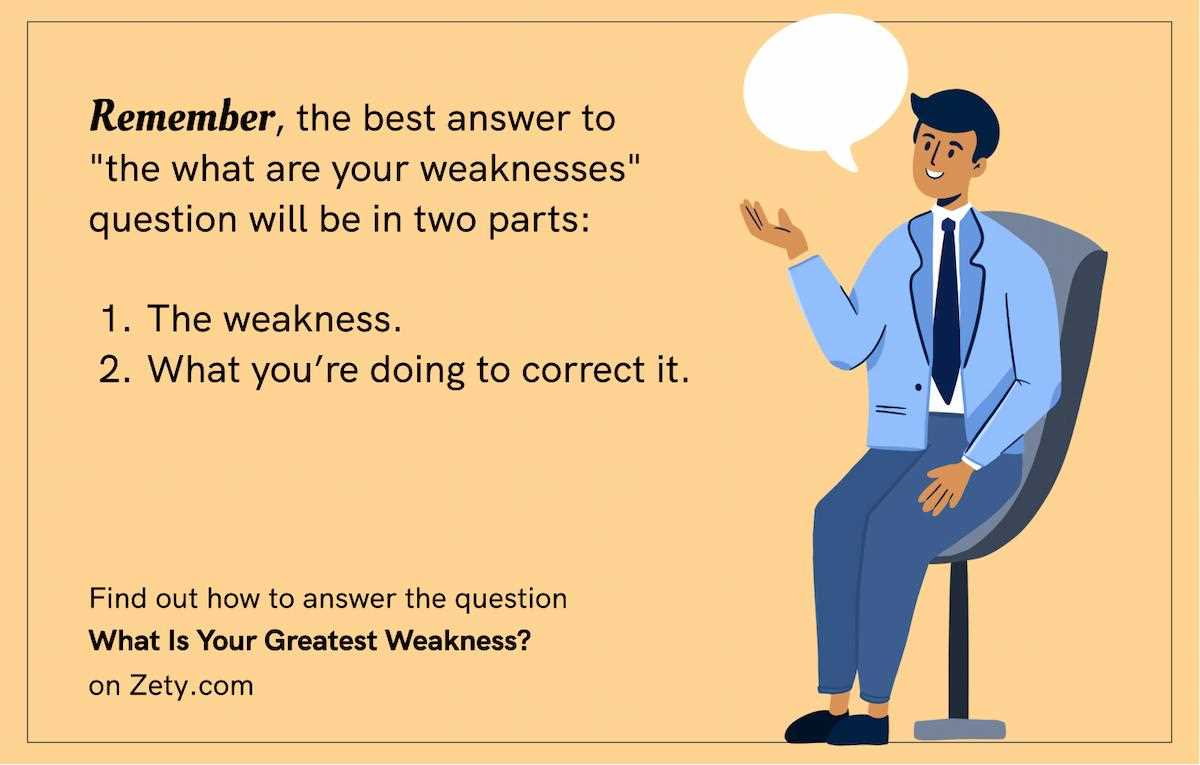
To make a strong impression, it’s important to align your personal qualities with the specific requirements of the role you are applying for. By demonstrating how your unique skills can contribute to the company’s objectives, you show that you understand both the position and the organization. This personalized approach increases your chances of standing out as the ideal candidate.
Research the Company and Role
Before discussing your personal attributes, take the time to research the company and the job description. Understand what challenges the company is facing and what key attributes they value in employees. Tailoring your qualities to address these needs makes your response more relevant and convincing.
Highlight Relevant Skills
Choose qualities that directly relate to the job at hand. For example, if the role involves working under pressure, emphasize your ability to remain calm and focused in stressful situations. If collaboration is key, discuss how well you work in teams and contribute to group success. This targeted approach ensures your response is directly aligned with what the employer is seeking.
By customizing your response in this way, you not only show that you are well-suited for the role but also demonstrate your commitment to contributing positively to the company’s success.
Why Self-Awareness Is Key to Your Answer
Being aware of your own abilities is crucial when describing your personal qualities during a job conversation. Understanding your strengths allows you to communicate them confidently and genuinely, ensuring that your response is both authentic and relevant. Without self-awareness, it’s easy to either overstate or underestimate your capabilities, which can lead to a less impactful response.
By reflecting on past experiences and recognizing what truly sets you apart, you can provide a more thoughtful and accurate representation of what you bring to the table. Employers value candidates who can speak honestly about their skills and limitations, as it demonstrates maturity and self-confidence.
| Benefit | How It Helps |
|---|---|
| Authenticity | Shows you are self-aware and genuine in your responses. |
| Clarity | Helps you explain your qualities with confidence and precision. |
| Improved Focus | Allows you to focus on the qualities that truly align with the role. |
| Building Trust | Creates a more credible and trustworthy impression with the interviewer. |
By developing self-awareness, you can provide a clearer and more persuasive portrayal of your capabilities, making a stronger case for why you are the best fit for the job.
Showcasing Skills That Align With the Role

When discussing your abilities during a job conversation, it is essential to highlight the qualities that directly relate to the tasks and responsibilities of the position. By focusing on skills that align with the specific requirements of the role, you demonstrate that you understand the job and are prepared to contribute effectively from day one.
Start by reviewing the job description and identifying the key skills the employer values. Tailor your response to emphasize how your experiences and talents meet these needs. This targeted approach will show that you are not only qualified but also highly suited for the role.
- Problem-solving abilities: If the role requires quick thinking and adaptability, emphasize your experience in overcoming challenges and finding effective solutions.
- Teamwork skills: Highlight your ability to collaborate and contribute to group success, especially if the position involves working closely with others.
- Leadership qualities: If applicable, showcase your ability to guide teams or projects, demonstrating initiative and responsibility.
- Communication expertise: Stress your ability to clearly convey ideas, whether in written or verbal form, especially if the role demands frequent interaction with others.
By focusing on these skills and providing concrete examples, you can show how your qualifications align perfectly with the role, making a compelling case for your candidacy.
Examples of Strengths to Mention in Interviews
When discussing your abilities during a job conversation, it’s important to highlight the qualities that not only set you apart but also add value to the position. By selecting relevant attributes that are in demand for the role, you can demonstrate that you’re well-equipped to contribute to the organization’s success. Here are some examples of key qualities that are often sought after by employers.
- Adaptability: The ability to adjust to changing circumstances and take on new challenges is highly valued in fast-paced environments.
- Problem-solving: Being able to analyze situations and come up with effective solutions shows critical thinking and resourcefulness.
- Time management: Employers appreciate candidates who can prioritize tasks, meet deadlines, and work efficiently under pressure.
- Collaboration: The ability to work well with others, contribute to group efforts, and maintain positive working relationships is key in most roles.
- Attention to detail: A focus on accuracy and quality is essential in roles where precision is critical.
- Leadership: Even if you’re not in a management role, showing leadership skills such as initiative, decision-making, and motivating others can be a great asset.
- Communication: Effective communication, both verbal and written, is vital for conveying ideas, collaborating with teams, and engaging with clients or customers.
By focusing on these qualities and tailoring your examples to the specific needs of the role, you can present yourself as a strong and relevant candidate. Make sure to provide real-life examples of how you’ve applied these abilities in the past to back up your claims.
How to Avoid Generic Responses in Interviews

When discussing your personal qualities, it’s crucial to move beyond the typical, overused statements that many candidates rely on. Generic responses can make you seem unprepared or insincere, and they fail to set you apart from other applicants. Instead, aim to provide specific and tailored examples that highlight your unique skills and experiences.
- Be Specific: Avoid vague statements like “I’m a hard worker.” Instead, give concrete examples of situations where you demonstrated your dedication, such as meeting tight deadlines or managing a challenging project.
- Avoid Overused Phrases: Phrases like “I’m a perfectionist” or “I work well under pressure” can sound insincere. Instead, focus on how these qualities play out in your work, providing details that show real value.
- Focus on Relevant Examples: Tailor your response to the role by emphasizing qualities that are most important for the position. If the job requires strong teamwork, for example, share a story about how you worked effectively with others to achieve a goal.
- Show Growth: Rather than simply stating what you’re good at, explain how you’ve developed your skills over time. Employers appreciate candidates who demonstrate self-improvement and continuous learning.
By focusing on these strategies, you can avoid falling into the trap of generic responses and instead present a more compelling, authentic case for why you’re the best fit for the job.
Crafting a Memorable Answer to Stand Out
To leave a lasting impression during a job conversation, it’s essential to deliver a response that is not only relevant but also memorable. A well-crafted response can make you stand out from other candidates by showcasing your unique skills and experiences. The key is to be specific, authentic, and to tie your qualities directly to the role you’re applying for.
- Tell a Story: Rather than just listing qualities, provide a brief story that illustrates how you demonstrated the ability in a real-life situation. This makes your response more engaging and relatable.
- Use Quantifiable Results: Whenever possible, back up your statements with numbers or specific outcomes. For instance, “I increased sales by 20% in my previous role” makes a much stronger impact than simply stating you’re results-oriented.
- Connect to the Role: Highlight how the skill you’re discussing aligns with the responsibilities of the job. Show the employer how your abilities will help them achieve their goals.
- Be Genuine: Authenticity is key. Don’t exaggerate or overstate your abilities–be honest about your qualities and how they have helped you in your career so far.
- Stay Concise: While storytelling is important, make sure your response remains focused and to the point. A clear, concise response will be more impactful than a long-winded one.
By incorporating these elements, you can create a memorable response that not only captures the attention of your potential employer but also effectively showcases why you are the right fit for the position.
Linking Your Strengths to Company Values
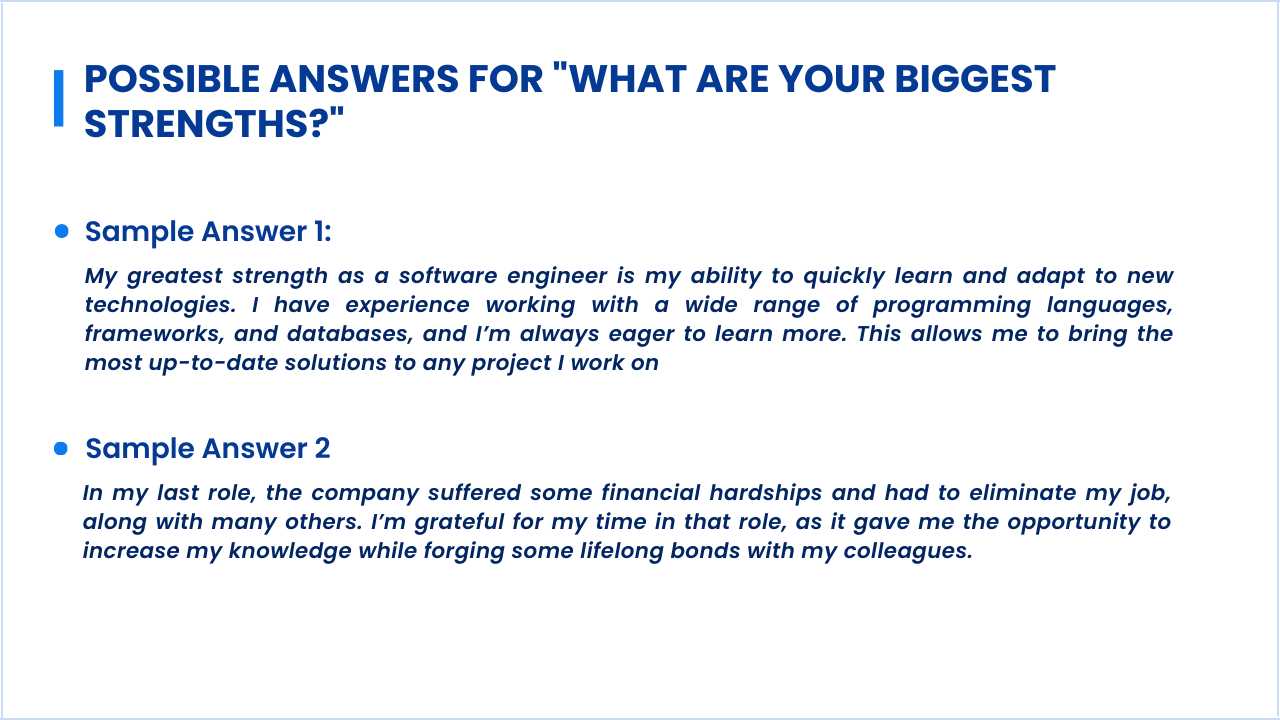
Aligning your personal abilities with the core values of the company is a powerful way to demonstrate your suitability for the role. By highlighting qualities that resonate with the organization’s mission, you not only show that you’re a good cultural fit but also that you understand what the company values most. This approach helps create a compelling connection between your skills and the company’s goals.
Understand the Company’s Values
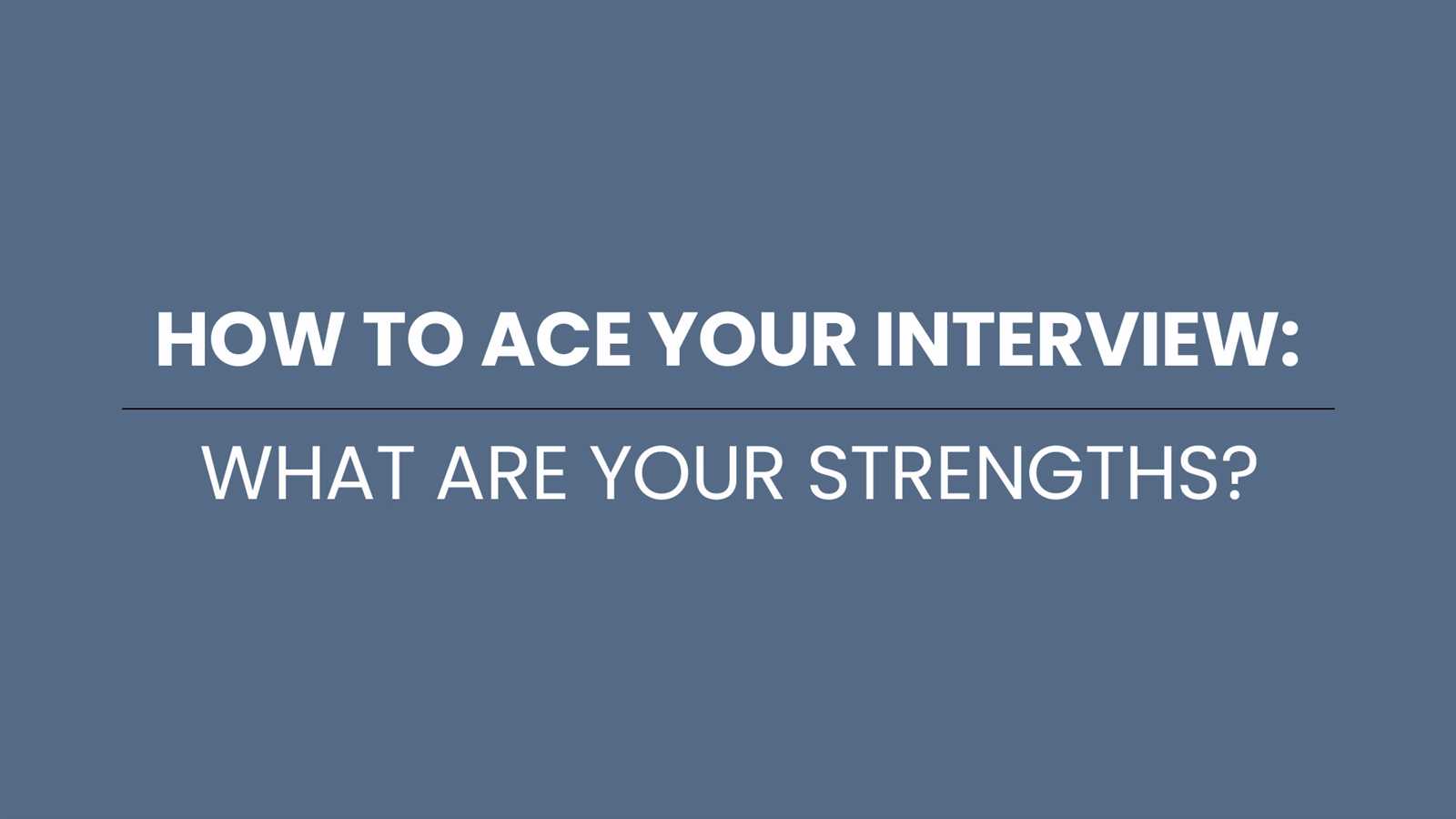
Before discussing your abilities, take time to research the company’s core principles. Visit their website, read about their mission, and explore their culture. Identify the values that stand out, whether it’s innovation, teamwork, customer focus, or integrity. Knowing these values will allow you to tailor your response in a way that speaks directly to what the company holds important.
Provide Relevant Examples
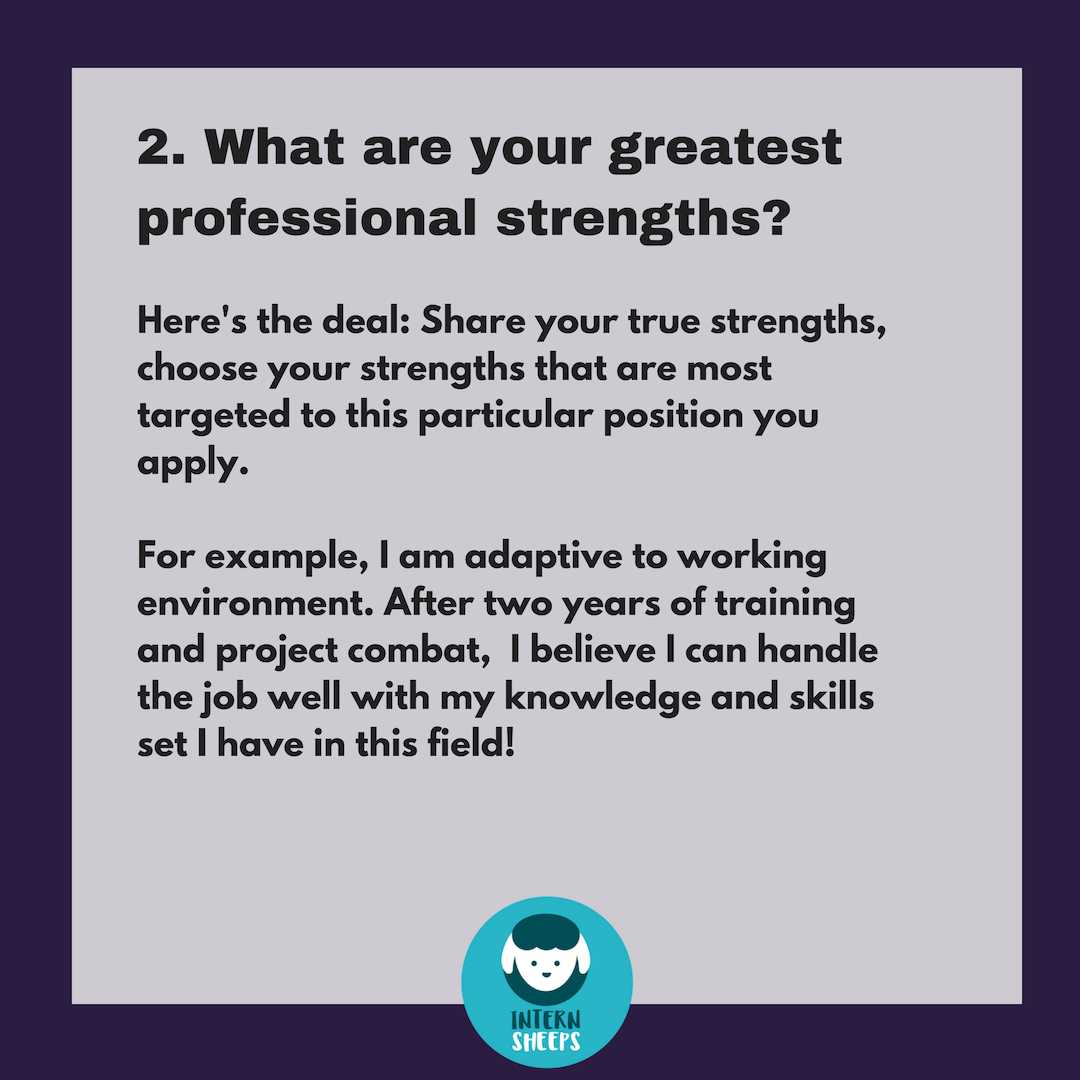
Once you’ve identified the company’s values, connect them to your own qualities with concrete examples. For instance, if the company emphasizes collaboration, talk about a time when you successfully worked as part of a team to achieve a common goal. If they value innovation, explain how you’ve contributed new ideas in previous roles and the positive impact they had.
- Adaptability: If the company values flexibility, share how you’ve thrived in dynamic environments and adjusted to changes quickly.
- Problem-solving: If innovation is key to their success, discuss instances where your creative solutions have driven positive results.
- Leadership: For companies focused on growth and development, highlight your experience in leading teams or initiatives.
By linking your personal abilities to the company’s values, you reinforce that you are not only a qualified candidate but also someone who genuinely fits within their culture and can contribute to their vision and success.
How to Describe Strengths With Confidence
When discussing your personal qualities, the way you express them can make all the difference. Confidence not only helps you convey your abilities more effectively, but it also reassures the listener of your competence. By presenting your qualities assertively, you demonstrate self-assurance without sounding boastful, which is key to making a positive impression.
- Own Your Abilities: Acknowledge your strengths with pride, but avoid coming across as arrogant. Being confident means being comfortable talking about your successes while remaining humble.
- Use Positive Language: Focus on how your abilities have made a difference in your previous roles. Instead of saying, “I think I’m good at…”, say, “I have consistently achieved…” or “I have successfully handled…”.
- Provide Evidence: Confidence is backed up by results. Share specific examples or outcomes that demonstrate your effectiveness. This adds credibility and reinforces your self-assurance.
- Maintain Body Language: Non-verbal cues are just as important as your words. Sit up straight, maintain eye contact, and speak clearly. A confident posture reflects your comfort with your abilities.
- Be Concise: Avoid over-explaining or overselling. Confidence comes across when you can state your abilities directly and concisely, without hesitation or unnecessary elaboration.
| Strategy | Description |
|---|---|
| Own your abilities | Speak with assurance, acknowledging your successes without exaggeration. |
| Provide concrete examples | Support your qualities with specific instances that demonstrate your skills in action. |
| Use positive language | Frame your strengths in a way that highlights results, not just potential. |
By following these steps, you can describe your qualities with conviction and leave a lasting, positive impression, while maintaining professionalism and authenticity.
Why Honesty Matters in Your Response

When discussing your personal attributes, being truthful is crucial for building trust and establishing credibility. Honesty not only helps you present a genuine version of yourself but also sets the tone for a transparent conversation. By sharing accurate and authentic details, you create a connection with the listener, making your response more relatable and meaningful.
- Builds Trust: Honesty fosters trust between you and the interviewer. When you provide truthful information, you show integrity, which is an essential trait employers value.
- Avoids Misrepresentation: Exaggerating or fabricating qualities may lead to unrealistic expectations. Being honest ensures that both you and the company have aligned expectations about your role and abilities.
- Shows Self-Awareness: Acknowledging both your strengths and areas for improvement demonstrates maturity and self-awareness, which are key for personal and professional growth.
- Promotes Authenticity: Genuine responses help you stand out as an authentic candidate. Employers appreciate candidates who are confident in their true abilities rather than trying to fit into a preconceived mold.
- Reduces Anxiety: When you’re honest, there’s no need to remember exaggerated details or fabricated stories, making it easier to be calm and composed during the conversation.
By remaining honest in your responses, you create an opportunity for a more meaningful exchange. Employers value transparency, and showcasing your true abilities in an authentic way will help you build a stronger connection with potential employers.
Balancing Humility and Confidence in Your Response
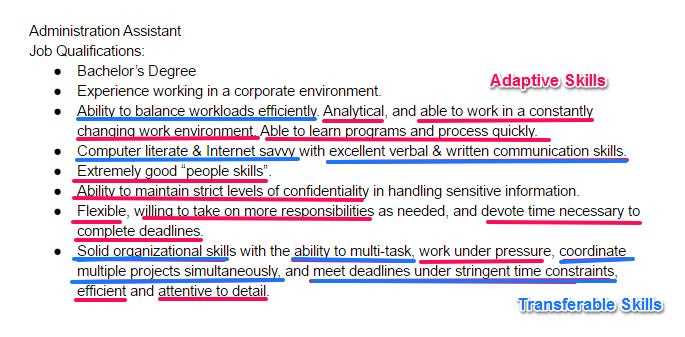
When discussing your personal attributes, striking the right balance between humility and confidence is key. While it’s important to convey your abilities with self-assurance, it’s equally essential to remain modest and avoid coming across as arrogant. Finding this balance ensures that you appear competent without appearing boastful, making your response both compelling and relatable.
- Be Assertive, Not Arrogant: Confidently express your accomplishments and abilities, but avoid overstating them. Focus on your contributions without exaggerating the impact.
- Acknowledge Team Efforts: Recognizing the role of others in your achievements shows humility. It reflects a collaborative mindset, which is highly valued in most professional settings.
- Focus on Results: Instead of listing general traits, highlight specific outcomes. Sharing measurable results demonstrates your effectiveness without sounding boastful.
- Use Modest Language: Choose words that convey your abilities without inflating them. For example, instead of saying, “I’m the best at this,” say, “I have successfully handled challenges in this area.”
- Be Open About Learning: Acknowledging areas for growth or ongoing learning shows that you are humble and open to improvement. This adds depth to your self-presentation.
By carefully balancing humility and confidence, you demonstrate emotional intelligence and a strong understanding of how to present your abilities in a professional setting. This approach ensures that you come across as both capable and approachable, two qualities that are highly valued in any candidate.
Using Personal Stories to Illustrate Strengths
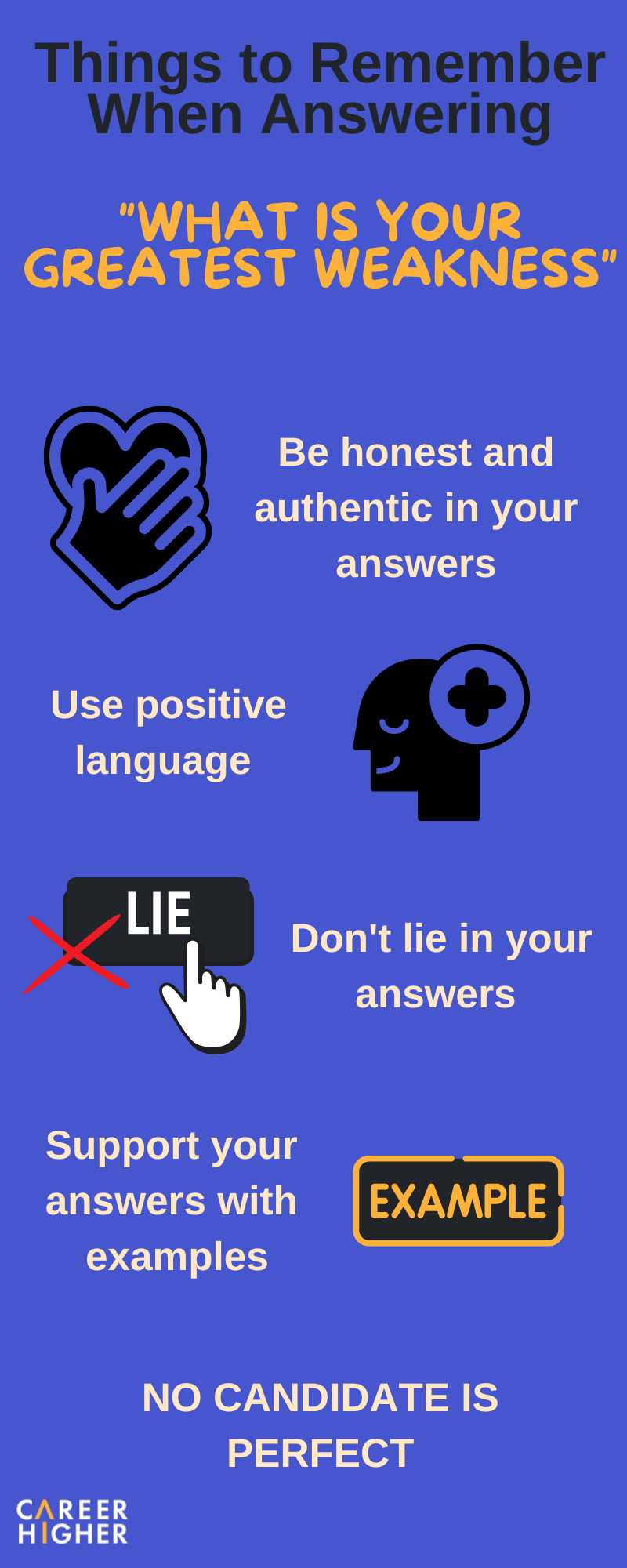
One of the most effective ways to highlight your personal attributes is by sharing real-life experiences. Telling a story allows you to provide concrete examples of how you’ve demonstrated key qualities in action. This approach not only makes your traits more tangible but also helps you connect with your audience on a more personal level.
- Make it Relevant: Choose stories that are directly tied to the qualities you’re discussing. This ensures that the narrative feels authentic and supports the point you’re trying to make.
- Focus on Specifics: Instead of general statements, describe the situation, your actions, and the outcome. Specific examples make your qualities more believable and memorable.
- Show Growth: Use stories that demonstrate how you’ve learned from challenges. This highlights not just your abilities, but also your resilience and adaptability.
- Keep it Concise: Ensure that your story is brief and to the point. Avoid going into excessive detail that could distract from the message you’re trying to convey.
- Reflect on the Impact: Conclude with how your actions led to positive outcomes. This shows that your qualities have practical and meaningful applications.
Personal stories are a powerful tool in any conversation, especially when presenting your capabilities. They allow you to illustrate abstract concepts with clear, relatable examples, making your presentation more engaging and impactful.
Why Strengths Should Align With Your Resume
When discussing your abilities and qualities, it’s essential that they align with what you’ve highlighted in your resume. Consistency between your application materials and your responses creates a cohesive and trustworthy narrative. If your self-presentation matches the qualifications and skills you’ve outlined, it reinforces your credibility as a candidate.
Building Trust with Consistency
Employers look for alignment between what you claim and what they see on paper. If your attributes align with your resume, it makes your profile stronger and more believable. This consistency shows that you not only understand your own capabilities but also have the experience and background to back them up.
Highlighting Relevant Skills
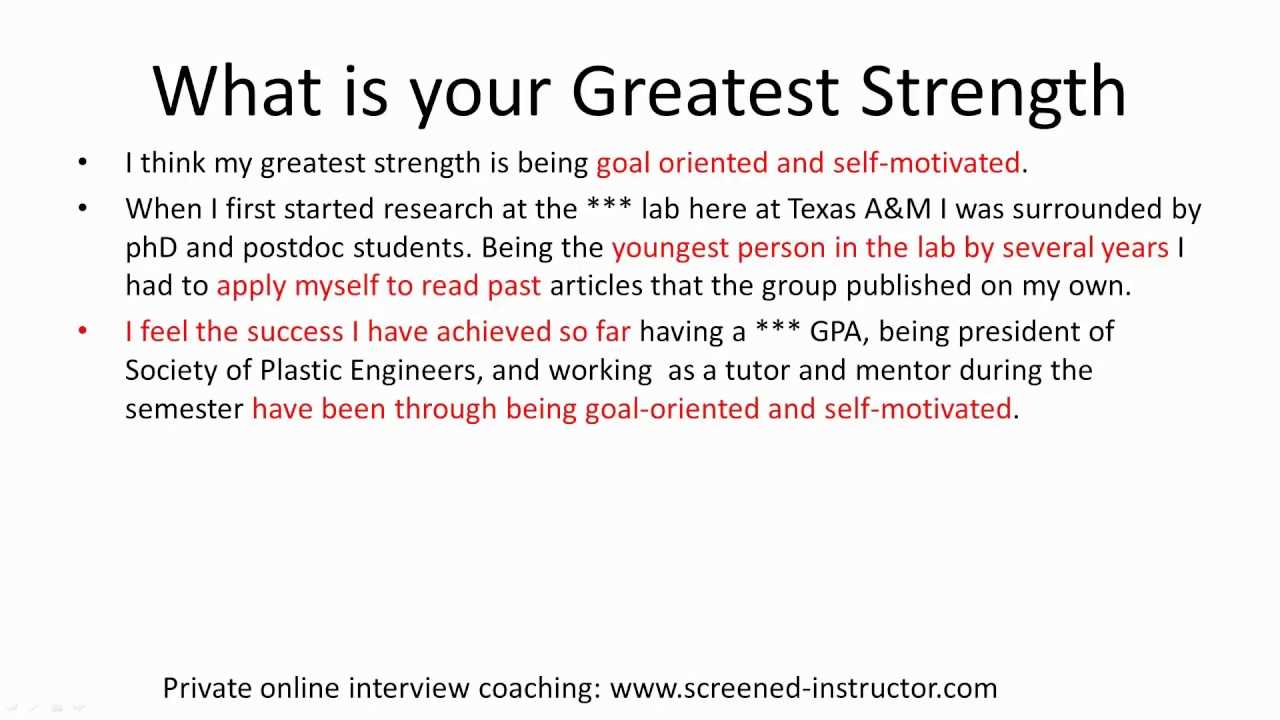
Linking your qualities to the specific skills and experiences mentioned in your resume allows you to present yourself as a well-rounded candidate. By making direct connections, you demonstrate how your past experiences have shaped your abilities, providing clear evidence of your fit for the role.
- Ensure Alignment: Before discussing your traits, review your resume to identify the key skills and experiences you’ve listed.
- Support Claims: Use examples from your resume to validate your strengths, showing real-world applications of your qualities.
- Stay Relevant: Tailor your response to focus on the traits and experiences that are most important for the job you are applying for.
In summary, matching your personal qualities to the details in your resume helps create a unified and persuasive application. It signals to employers that you are clear about your capabilities and that your background supports what you claim, making you a stronger candidate.
Avoiding Overconfidence in Interview Responses

While it’s important to highlight your abilities, it’s equally crucial to maintain a sense of humility during the conversation. Overemphasizing your qualities can create the impression of arrogance, which may detract from your suitability for the role. Striking the right balance between confidence and modesty is key to making a positive impact on potential employers.
Understanding the Fine Line

There is a fine line between presenting yourself confidently and coming across as overly self-assured. Employers want to know about your skills, but they also want to see that you can acknowledge areas for improvement and are open to growth. Acknowledging your achievements while remaining grounded is crucial for fostering a positive perception.
How to Avoid Coming Across as Overconfident
To ensure you don’t sound boastful, it’s important to focus on providing specific examples of your skills in action, rather than simply stating them. Backing up your claims with facts and showing how your strengths have contributed to previous successes helps demonstrate competence without exaggerating your abilities.
- Be Specific: Rather than making broad, sweeping statements, provide clear examples of how your abilities have led to tangible outcomes.
- Show Self-Awareness: Acknowledge areas where you have room for improvement, demonstrating humility and a willingness to grow.
- Avoid Superlatives: Refrain from using words like “best” or “perfect” when describing yourself. Instead, focus on how your abilities are well-suited to the position.
- Balance with Teamwork: Emphasize collaboration and how your skills complement those of others, highlighting your ability to work well within a team environment.
By keeping these points in mind, you can confidently discuss your abilities without crossing into overconfidence. Showing both competence and humility allows you to present yourself as a capable, yet approachable candidate, which is often the best impression to leave during such discussions.
Preparing for Follow-Up Questions About Strengths
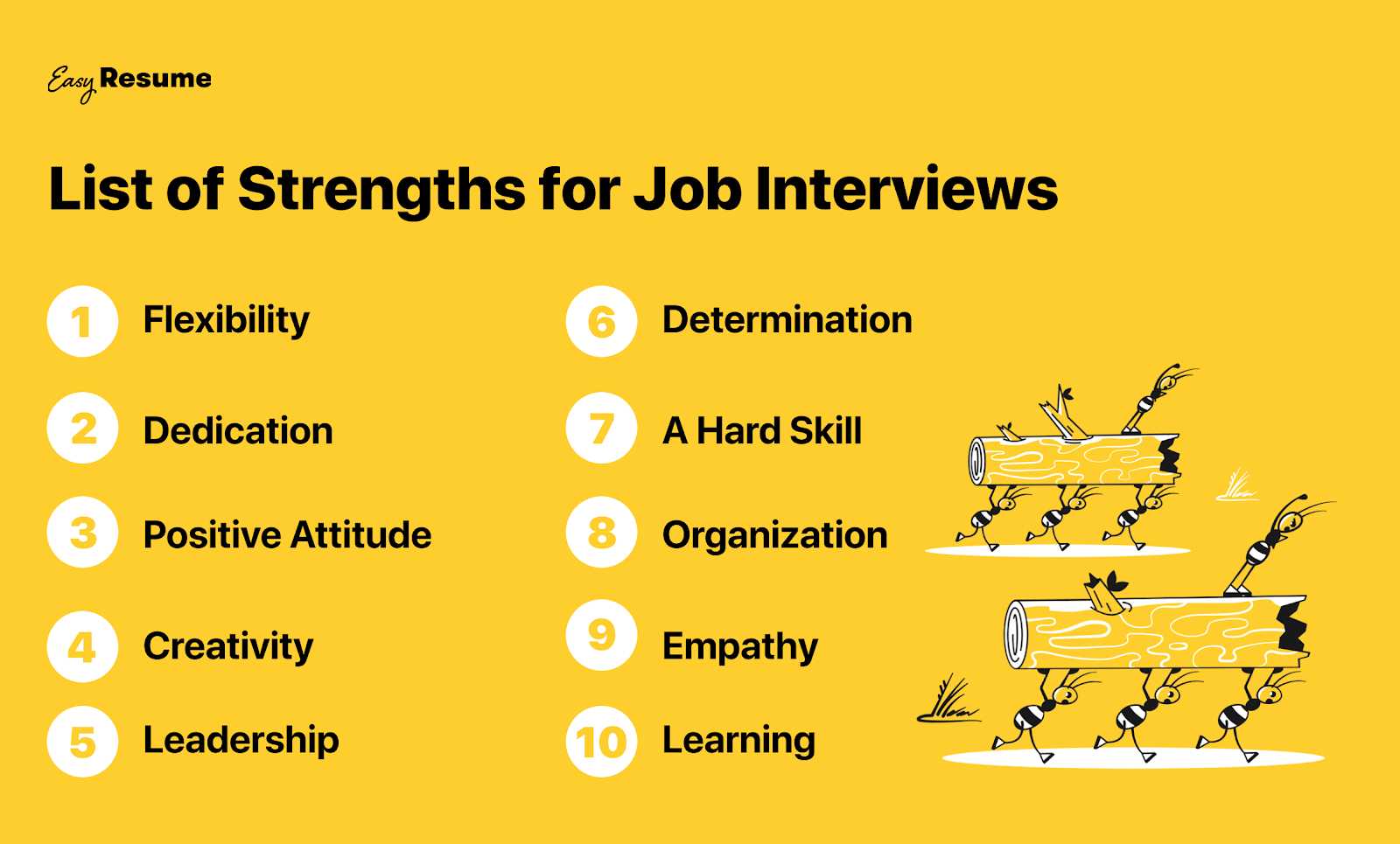
After sharing your abilities, it’s common for interviewers to ask follow-up questions to delve deeper into your claims. These questions help them assess whether your qualities truly align with the role and how well you can apply them in different situations. Being prepared for such inquiries ensures you can respond thoughtfully and reinforce your suitability for the position.
Anticipating Common Follow-Up Questions
Interviewers often ask follow-up questions to clarify the impact of your abilities. You might be asked to explain how you’ve used your skills in past roles or how you’ve overcome challenges. Being ready with specific examples can demonstrate the true value of your attributes and provide insight into how you approach problem-solving or collaborate with others.
- Provide Specific Examples: Prepare concrete instances where your abilities have made a noticeable difference in your previous roles, showing how they contributed to positive outcomes.
- Be Ready to Discuss Challenges: You might be asked how you handle situations where your skills were tested. Be ready to explain how you’ve adapted or improved in those situations.
- Explain Results: Interviewers may want to understand the tangible results your abilities have led to. Be prepared to discuss measurable outcomes such as improved efficiency, successful project completions, or increased customer satisfaction.
How to Frame Your Responses

When responding to follow-up questions, it’s important to stay calm and confident while maintaining humility. Keep your examples relevant to the role you’re applying for, demonstrating how your abilities will benefit the company. This will not only reinforce your original points but also show that you understand the needs of the position and are capable of delivering results.
By anticipating these questions and preparing thoughtful, well-structured responses, you can further highlight your value as a candidate and leave a lasting impression on your potential employer.